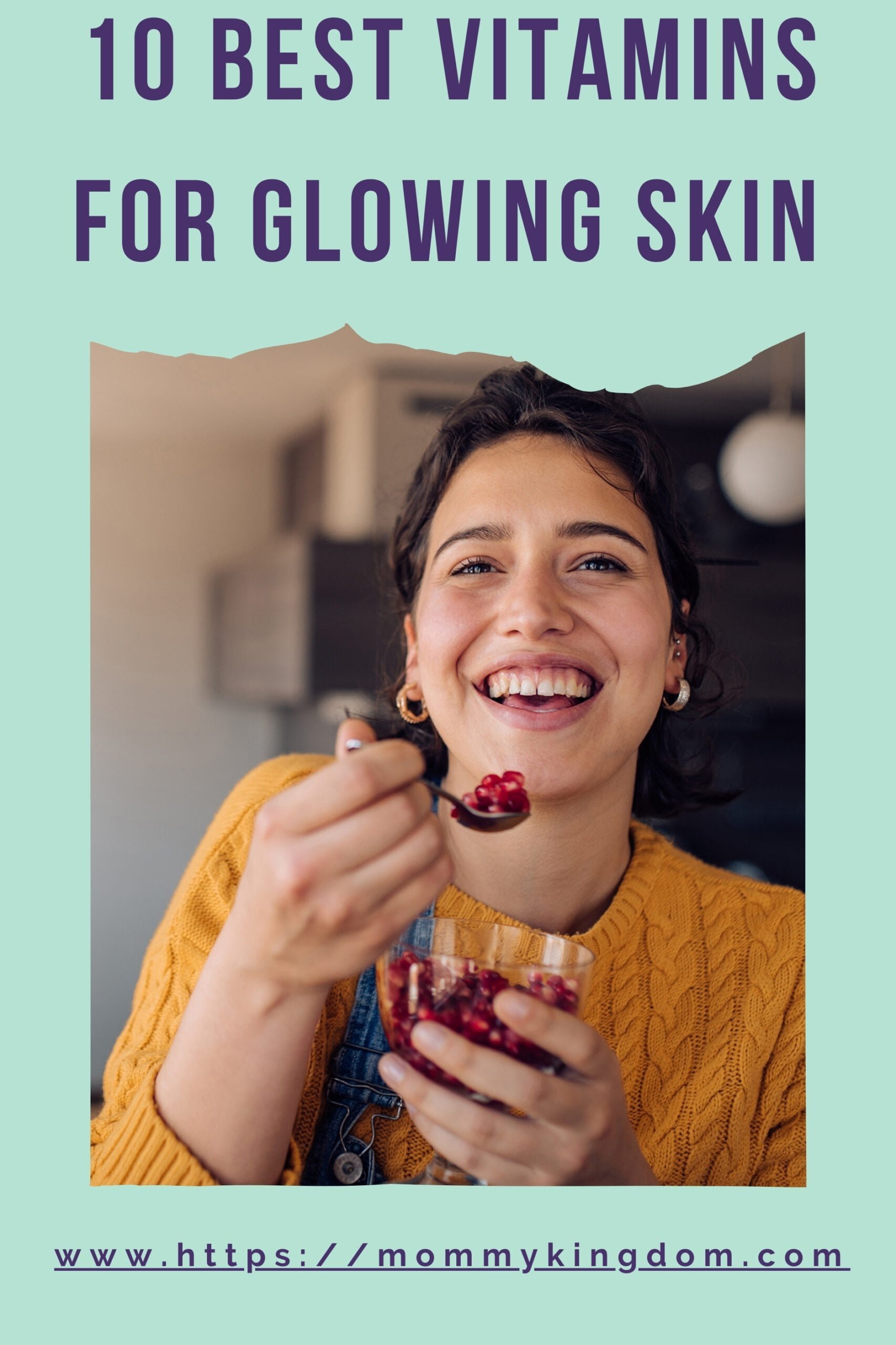Discover the 10 Best Vitamins For Glowing Skin in this comprehensive guide. Learn how these vitamins can transform your skin and boost your confidence.
Achieving glowing skin is a common desire, and it’s not just about using the right skincare products. Your skin’s health is closely linked to your diet and the vitamins you consume. In this article, we will explore the 10 best vitamins for glowing skin. We’ll delve into the benefits of each, where to find them, and how they can help you achieve that radiant complexion you’ve always wanted.
1.Vitamin A

Vitamin A is essential for skin health because it promotes cell turnover. This means it helps your skin shed old, dead cells and replace them with new ones, resulting in a fresher, more radiant complexion. Additionally, it can fade acne scars and improve skin texture. Vitamin A can be found in foods like sweet potatoes, carrots, and leafy greens.
2.Vitamin C

Vitamin C is a potent antioxidant that can work wonders for your skin. It helps brighten the skin, reduce the appearance of fine lines and wrinkles, and even out skin tone. Citrus fruits, strawberries, and bell peppers are excellent sources of this vitamin.
3.Vitamin E

Vitamin E is known for its ability to protect the skin from UV damage, which is essential for maintaining healthy, glowing skin. It also helps retain moisture in the skin, preventing dryness. Foods like nuts, seeds, and spinach are rich in vitamin E.
4.Vitamin D

Vitamin D is vital for overall skin health. A deficiency can lead to dryness and dullness. One of the best sources of vitamin D is sunlight, so spending some time outdoors can benefit your skin. Additionally, you can find it in fatty fish and fortified dairy products.
5.Vitamin K

Vitamin K is particularly helpful for reducing under-eye circles and bruising, which can contribute to a more even skin tone. Incorporate foods like leafy greens, broccoli, and Brussels sprouts into your diet to increase your vitamin K intake.
6.Biotin (Vitamin B7)

Biotin, also known as Vitamin B7, is essential for healthy hair and nails. These aspects of your appearance contribute to an overall radiant look. You can get biotin from foods like eggs, nuts, and avocados.
7.Niacin (Vitamin B3)

Niacin, or Vitamin B3, offers several benefits for your skin. It improves skin elasticity, reduces redness, and can help with acne. Foods like lean meats, peanuts, and mushrooms are good dietary sources of niacin.
8.Vitamin B5 (Pantothenic Acid)

Vitamin B5, also known as pantothenic acid, is essential for maintaining skin moisture. This helps reduce dryness and promotes a soft, supple complexion. Whole grains, avocado, and chicken are rich in this vitamin.
9.Folate (Vitamin B9)

Folate, or Vitamin B9, is crucial for repairing damaged DNA, which contributes to youthful-looking skin. To increase your folate intake, include foods like beans, lentils, and leafy greens in your diet.
10.Vitamin B12

Vitamin B12 is essential for preventing skin dryness and hyperpigmentation. You can find it in animal products such as meat, fish, and dairy.
Final Words
In the conclusion, we summarize the key points of the article, emphasizing that achieving glowing skin is attainable by nourishing the skin from the inside out through a diet rich in the 10 best vitamins discussed. We stress the importance of consistency and consulting healthcare professionals for guidance on vitamin intake. The conclusion leaves the reader with a clear takeaway and reinforces the article’s main message.
FAQs
Can I get all these vitamins from my diet alone?
While a balanced diet can provide most of these vitamins, some people may benefit from supplements, especially if they have deficiencies. It’s advisable to consult a healthcare professional for guidance on supplementation.
How long does it take to see results in my skin?
Results can vary from person to person, but with consistent intake of these vitamins, you can generally expect to see improvements in your skin’s health within a few weeks to a couple of months.
Are there any side effects of consuming these vitamins?
Most vitamins are safe when consumed through food. However, excessive supplementation can lead to adverse effects. It’s essential to consult a healthcare professional for personalized advice regarding vitamin intake.
Can these vitamins replace skincare products?
Vitamins are valuable additions to your skincare routine, but they work best when combined with a good skincare regimen. Skincare products and vitamins can complement each other for optimal results.
What other lifestyle changes can improve skin health?
In addition to vitamin intake, staying hydrated, getting enough sleep, and protecting your skin from UV rays are crucial for maintaining healthy and glowing skin.
Are there any vitamins to avoid if I have allergies?
If you have food allergies, it’s important to be cautious about the sources of these vitamins. Consult an allergist for personalized advice and to ensure you’re not consuming anything that triggers allergies.
